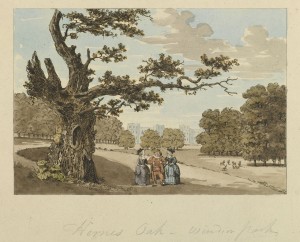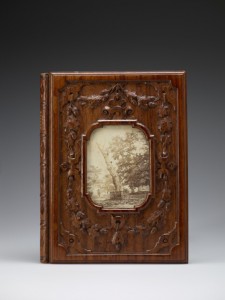Posts Tagged ‘Windsor’
A Shakespearean ghost and an old tree

Herne’s Oak, Windsor Park circa 1799
Etching with hand colouring, attributed to Samuel Ireland (1744-1800). The two Merry Wives of Windsor, Mistress Page and Mistress Ford, are standing with Falstaff at Herne’s Oak.
Drawings Gallery, Windsor Castle
Royal Collection Trust/© Her Majesty Queen Elizabeth II 2016
In the grounds of Windsor Castle in England stand thousand-year-old oaks so huge and gnarled and blasted it’s easy to imagine them haunted by spirits. Shakespeare used this conceit in his play “The Merry Wives of Windsor.”
When I was a Windsor wife in the early 1960s , I attended a performance by the Windsor Repertory Theatre of “Merry Wives” one summer evening in the castle gardens. Probably written to amuse Queen Elizabeth I, the play uses as its setting then-familiar Windsor landmarks, such as the 14th century Garter Inn on High Street and Herne’s Oak in Windsor Great Park.
The play centers around the drinker and gambler Sir John Falstaff, known from the plays Henry IV part 1 and part 2. Short of money, he comes to Windsor where he attempts to seduce both Mistress Page and Mistress Ford in hope that at least one of them will share her husband’s wealth with him. He writes each wife an identical letter, but the two women, who are close friends, immediately show each other their letters and are outraged.
The wives decide to teach Falstaff a lesson, and pretend to lead him on while planning his downfall. He is dumped from a laundry basket into the muddy River Thames, and beaten while disguised as the Old Woman of Brentford, who is believed to be a witch. With their husbands in on the secret, they concoct a final revenge for his clumsy insults to their virtue. Mistress Page sets the scene:
There is an old tale goes that Herne the hunter,
Sometime a keeper here in Windsor Forest,
Doth all the winter-time, at still midnight,
Walk round about an oak, with great ragg’d horns;
And there he blasts the tree, and takes the cattle,
And makes milch-kine yield blood, and shakes a chain
In a most hideous and dreadful manner.
You have heard of such a spirit, and well you know
The superstitious idle-headed eld
Receiv’d, and did deliver to our age,
This tale of Herne the hunter for a truth.

Cover of William Perry’s “A Treatise on the Identity of Herne’s Oak, Shewing the Maiden Tree to Have Been the Real One”
Probably presented to Queen Victoria by William Perry, c. 1867
Drawings Gallery, Windsor Castle
Royal Collection Trust/© Her Majesty Queen Elizabeth II 2016
The Royal Collection website notes:
Perry’s treatise claiming the authenticity of this tree echoed Queen Victoria’s own belief, though his view was not entirely unbiased since he had been given portions of the wood to carve into souvenirs, which include the binding of this book. A photograph of the tree shortly before its fall is inserted in the front board.
Falstaff is induced to dress as the ghost of Herne the Hunter and wait for the two women at Herne’s Oak, where he is pinched and tormented by local children dressed up as fairies.
Since Herne’s Oak has now fallen, exactly which tree it was—the one that fell in 1799 or the one in 1863—remains in dispute. Also unclear and undocumented are the origins of the myths about Herne the Hunter. Shakespeare was the first writer to mention him. His purported connection to ancient archetypes representing the primal power of nature may be an artifact of Victorian story-makers. Some evidence suggests there was a real game-keeper in Windsor Great Park named Herne or Horne, possibly in Elizabeth I’s time, possibly earlier, who, having committed some great offence for which he feared a dreadful punishment, hanged himself on an oak tree. Maybe Mistress Page had it right: the memory of such an event at a scary-looking tree could be enough to start a legend about a ghost.
